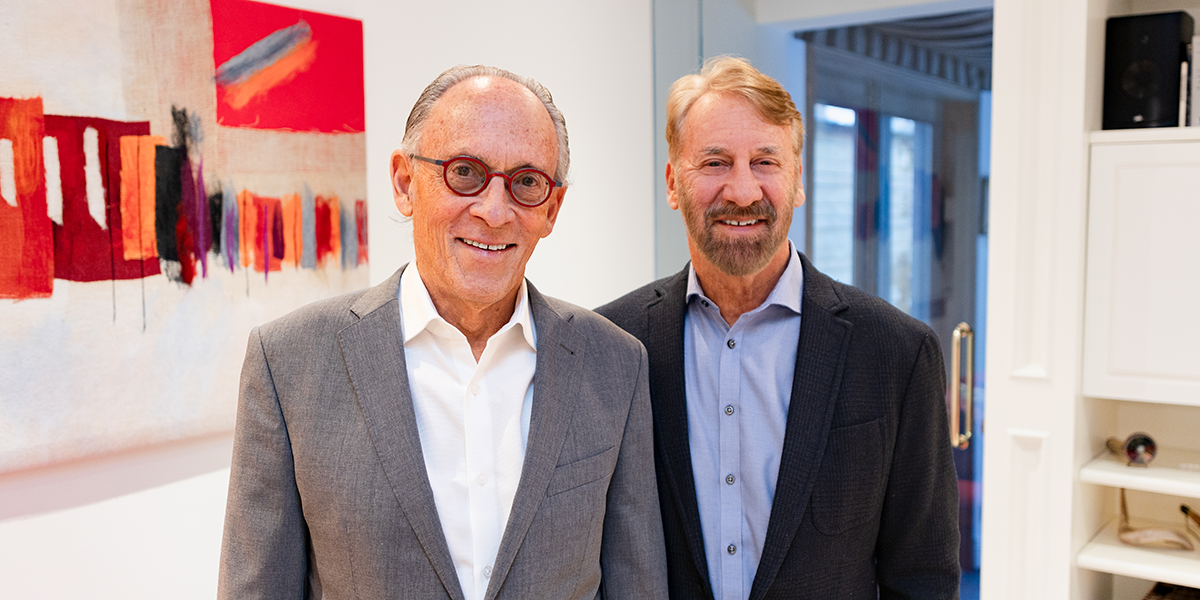
Mike Diamond and Jack Frieberg
The Jewish Foundation of Greater Toronto is a “hidden jewel” in Toronto’s Jewish community. It was established in 1962 to enhance Jewish life, and to strengthen the community today and for generations to come. The Foundation’s experts in Jewish philanthropy work with individuals, families, and organizations to help them fulfil their philanthropic goals.
We recently sat down with new Jewish Foundation Co-Chairs Jack Frieberg and Mike Diamond, who are letting us in on why they think the Foundation is a key asset for our community’s future.
In order to understand the role the Jewish Foundation plays in the community, it’s important to explain what it is to those who may be unfamiliar with it. Can you please describe how the Foundation works?
Jack:
The Jewish Foundation is a community foundation, in which you open a fund, and your donation is pooled and invested with the money from everyone else’s funds. Ideally your fund will grow over time, giving you the opportunity to distribute from the investment returns to the charities of your choice.
Mike:
Think of the Foundation like going to the bank. You can deposit money into an ATM, where it will sit and wait for you. Nothing wrong with that. Or you can speak to a financial advisor, who can invest your money to get the most out of it.
Also, there are two numbers our community absolutely needs to know about. First, the Foundation is incredibly successful—it sits at almost $1 billion in current and future gifts. Second, the Foundation has distributed more than $240 million to hundreds of organizations over the last five years. Those two facts alone should be enough to get people interested in learning more.
After October 7th, Toronto’s Jewish community came together in extraordinary ways. This includes Jewish Foundation fundholders distributing more than $9 million to UJA’s Emergency Appeal for the People of Israel. This ability to quickly deploy funds in a crisis is one of the Foundation’s greatest assets. Can you speak more to why this is so important?
Mike:
As opposed to a “regular” charity that needs to raise money, get pledges paid, etc., fundholders at the Jewish Foundation already have money available, making it easy for them to make distributions during a crisis. This flexibility is crucial for emergency campaigns, especially during hard financial times. Think about the biblical story of Joseph in Egypt. He predicted seven good years followed by seven bad ones. The Egyptians responded by stockpiling while they could. It’s the same idea here—contribute to your fund while your financial situation is good, so that you can still donate to important causes, even if there is an economic downturn.
Jack:
Pivoting quickly has been true for the Foundation a lot over the years. For example, fundholders started the Community Resilience Loan Fund during the pandemic in order to keep Jewish organizations afloat, especially Jewish non-profit summer camps. More than $2.7 million was provided from existing funds as interest-free loans to ensure their survival.
Fundholders have also been instrumental in helping the community with Jewish education (Generations Trust), Holocaust education (Toronto Holocaust Museum), and supporting survivors (Holocaust Survivors Support Fund).
Mike:
Exactly. The more that Foundation philanthropists can contribute, the bigger the “pot” is for them to distribute for a future crisis or urgent need.
There are many foundations out there with whom community members can open funds. What makes the Jewish Foundation stand out?
Mike:
There are two things about the Jewish Foundation that really make it stand out.
The first is the financial benefit. When money is invested, it is done so by a team of highly experienced professionals who take a low-risk approach. This means that the money works to balance generating a sufficient return with preserving long-term assets. It’s easy and ensures safeguarding against losing money. As well, administrative fees are low, there are no minimum annual contributions or distributions, and you can choose to keep your fund/donations anonymous (unlike a private foundation, which requires disclosure).
Jack:
The second is what I like to call “Jewish philanthropic intel,” which is really expertise in Jewish philanthropy. When you open a fund at the Foundation, you are assigned a philanthropic advisor. This is your go-to person for learning about community needs, charities of interest to you, etc. They are great sources of knowledge, especially when it comes to Jewish causes because of the unique relationship the Foundation has with UJA. The Foundation’s philanthropic advisors are also here to help discuss charitable giving as a family. If you’re interested in involving your children or grandchildren, the Foundation can help you with succession planning, wealth transfer, or how to ensure philanthropic continuity. The Foundation is here to help you exercise your tzedakah muscle.
When people learn about the incredible value of the Foundation, they wonder why they have never heard of it before. Yet, as you’ve both explained, it has been such an asset to the community for decades. How do you think we can get more people involved?
Jack:
The Jewish Foundation lets you be the philanthropist you want to be. There are some who hear the word “foundation” and assume you need incredible wealth to open a fund. But this is not necessarily the case here. Donor advised funds are a great way to get started, especially for those who are already donating to charity regularly or intend to do so in the future. The Jewish Foundation of Greater Toronto is the only one of its kind in our city, and it’s time more people understood its value.
To learn more about your options at the Jewish Foundation and how its philanthropic advisors can help you on your charitable journey, please contact [email protected] or 416-631-5703.
